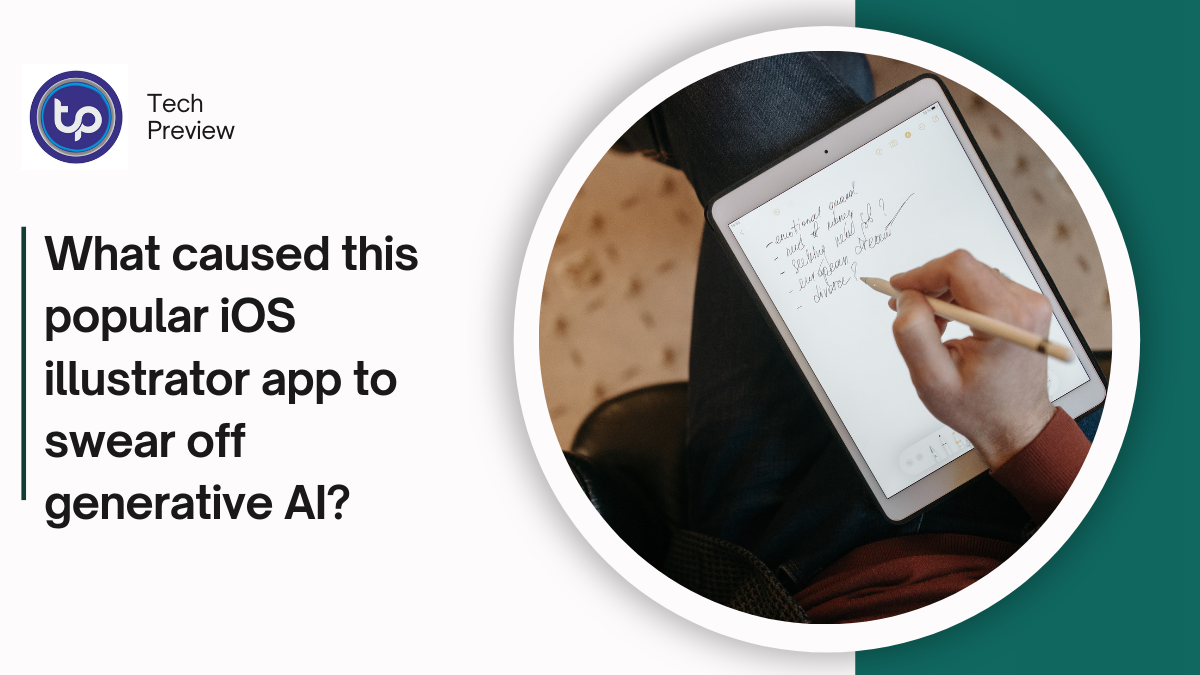In a generative AI-driven digital world, one popular iOS illustration app has taken a big stand: Procreate has promised not to integrate artificial intelligence into its tools.
This news has left many artists with discussions and has sparked a debate on whether artificial intelligence should be used within the creative arts.
While so many other platforms are trying as much as possible to include AI-powered features, Procreate deviated from this in moving them. Below is a need to look at what necessitated this move and the impact it had on the art fraternity.
Procreate’s stance against generative AI
Procreate stands out on the iPad for many reasons: it is easy to use and highly powerful. It has become one of the tools that digital artists turn to to work with freedom on their artwork. However, with its fast-growing use, Procreate has taken a stance against generative AI in technology.
In a recent video posted on X, formerly Twitter, CEO of Procreate James Cuda said, “We’re not going to be introducing any generative AI into our products.
I don’t like what’s happening to the industry, and I don’t like what it’s doing to artists.” This statement sets a boundary; regarding this issue, it underlines that they are committed to creativity by humans, not letting machines generate artistic pieces.
The reasoning behind Procreate’s decision
What, then, exactly made Procreate take such an absolute stand against generative AI? In a limited blog post on their official website, Procreate says generative AI is “ripping the humanity out of things.” As stated by the company, AI, founded on appropriation based on data, is inevitably leading the creative industry into a desolate future.
While Procreate loves machine learning as an exciting technology with many potential advantages, they feel their company has decided not to move in a direction considered unsuitable for their platform. They say they will always keep the human creativity, which they hold as the greatest treasure in the art world.
A divided art community
Procreate’s decision has reignited the ongoing debate surrounding the utilization of generative artificial intelligence within the art community.
Artists have been polarized regarding this issue, with certain individuals embracing AI-driven tools while others express apprehension regarding the ethical ramifications. Procreate’s anti-AI stance is perceived by many as a daring risk, thereby positioning the platform as a viable alternative for artists who harbour scepticism toward AI.
Many artists have voiced their support for Procreate’s decision on social media. “This is very much appreciated. Thank you,” one artist commented, while another noted, “Artists support each other and support those who allow us to continue doing what we do! So, thank you for all you do, and we are excited to see what the team does next.
However, not everyone agrees. Many artists voiced their disappointment, stating that AI could make for a good assistant and significantly improve their artwork. Claire Silver, an artist who often mixed AI with traditional techniques, said that what Procreate did could make it inaccessible for some of the users.
Click here to know more.
The future of Procreate
By adopting a contrarian stance, Procreate differentiates itself from other competitors. While most platforms, such as Adobe, have followed the trend of AI-driven features, Procreate is now placing a bet on human creativity. This strategy could really resonate with several artists who value tradition and have ethical misgivings about AI in art.
Procreate’s future appears promising, supported by a dedicated user base that values its commitment to human-centric tools. The platform’s choice to avoid artificial intelligence may appeal to an even larger audience that aligns with its principles. However, this decision poses a challenge as artificial intelligence progresses and becomes increasingly embedded within the creative sector.
How does this affect the industry?
Procreate’s decision comes at a critical moment for the digital art industry, further supporting the insidious argument about the role of artificial intelligence in creative industries and begging serious questions about what the future holds for digital tools.
As artificial intelligence gets closer to perfection, the distinctions between content created by humans and that produced by machines become increasingly nebulous.
Procreate’s stance requires the industry to take a step back and think about the ethical considerations that come with these developments, deliberating on the application of artificial intelligence in creative processes.
Conclusion
Procreate’s move to fire generative AI reportedly sparked a huge debate within the artistic community. While some artists applauded the move, others said that AI could enhance creativity rather than devalue it.
As the debate unfolds, Procreate sticks to its guns of protecting human creativity and providing tools to empower artists. This position will differentiate the platform in an industry that is starting to adopt artificial intelligence progressively, and it will be interesting to see how Procreate grows in the coming years.
People May Ask
Why did Procreate decide against using generative AI?
Procreate believes that generative AI is “ripping the humanity out of things” and presents a moral threat to human creativity.
What are some of the ethical concerns with generative AI in art?
These include ethical concerns that AI will eventually hijack and reproduce pre-existing works without due credit, as well as the fear of losing creativity to machines if AI has taken certain aspects of creativity away from humans.
How does Procreate’s stance impact its users?
It reassures Procreate that users at large believers in traditional methods yet fearing Artificial Intelligence in art are safe. This stance strengthens Procreate’s brand identity as a platform centered on human creativity.
RELATED ARTICLES
- How can Mac Users Split OLM Files by Size?
- Ultimate Squid Game Quiz: Test Your Knowledge with 50+ Trivia Questions
- How Templates Help Businesses Deliver Quality on a Budget – Cost-effective Solutions
- How to Make Money on Instagram in 2025 – Best Strategies for Creators
- Revolutionary Robotic Exoskeleton Can Teach Pianists to Play at Lightning Speed



![The 4 Best Free Spotify to MP3 Converter [2024]](https://www.techpreview.org/wp-content/uploads/2024/03/free-photo-of-a-girl-sitting-in-a-car-listening-to-music-on-her-smartphone-and-looking-at-song-lyrics-scaled.jpeg)





